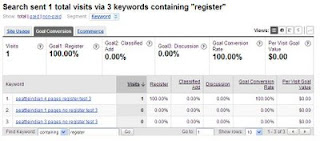Here is what I predicted:
Mobile Analytics – Mobile sites and mobile advertisings gain momentum. Mobile Analytics will be become a requirement to understand how the sites and advertising are performing. Currently you can either use log files, WAP gateway logs if you are one of the mobile carriers (this is what I did back in 2001 -2002) or services from Amethon. This year we will see more players in mobile Analytics. The reporting will become better than what has been offered to date.
Two recent press releases are proving that I was right in my prediction, one is from Bango and another from Omniture.
According to destinationCRM, a research has found that between 20 percent and 30 percent of overall Internet traffic is generated by mobile devices. In this article Matthew Langie, Omniture's senior director of product marketing said that the need for a mobile-analytics solution was clear: Clients were requesting this capability, and research alone has shown that consumers are readily using mobile phones, with subscriptions at 3.9 billion in 2008 and predicted to reach 5.6 billion by 2013. (Individuals, it's worth noting, may have multiple subscriptions.) A recent study by market research firm IDC predicted that 164.7 million smartphones will be shipped worldwide this year -- a figure expected to reach 363.2 million in 2012. Moreover, while 2007 saw 27 million phones with Wi-Fi capabilities, the service will reach 400 million by 2012.
According to a research by Bango, the most important feature requested by mobile site owners was “The daily/weekly/monthly number of unique visitors count”
However, capturing an accurate number of unique visitors is not easy in Mobile sites as not all of the mobile phones accept cookies and users share the same IP address (network address) and this IP also changes as users roam. The new offerings from both these providers claim to provide an accurate count of unique visitors. It remains to be seen how accurate they are. It is interesting that both of these providers announced their offering on the same day.
Bango
Bango unveiled new mobile site analysis capability to help website owners measure the value of mobile sites by accurately counting unique visitors browsing their site. This new capability in Bango Analytics, v3.0, complements existing campaign analysis functionality .
Bango uses a privacy protected Bango User ID to count and track unique visitors. The Bang User ID is compiled through sophisticated WAP gateway profiling, data from browser analysis, session information and network interactions. This unique user ID enables Bango to distinguish between new and repeat users and therefore precisely quantify the number of unique visitors.
Source : MarketWatch
Omniture
Omniture announced availability of Mobile Analytics in Site Catalyst version 14.1. According to an article on destinationCRM Omniture's effort to address the most common problems marketers face when tackling the mobile arena includes the following four features:
- In a partnership with mobile Internet advocate group dotMobi and its DeviceAtlas database, SiteCatalyst communicates with an extensive library of device profiles to accurately identify the mobile device accessing a Web page. This determines what video, audio, and text can be displayed, thereby giving marketers insight into what customers are using most frequently. Moreover, carrier identification gives marketers the ability to partner with carriers to set up other campaigns.
- Through the use of visitor identification technology such as cookies, subscriber identification, or header information, SiteCatalyst can identify a new visitor or a repeat visitor to deliver an experience akin to the traditional Internet.
- The solution aims to capture the right data from a variety of devices to garner insight about the page. Omniture's server places on each Web page a very small file that occupies a single pixel, allowing marketers to track the activity of the mobile device: where the user is clicking, what content is being downloaded, what video is being watched, etc.
- A geolocation component that recognizes where the site is being accessed from, thereby enabling Web publishers to deliver advertisements applicable to that location.
Thank you Sarah Dawson for helping me with this post.
--------------------------------------------------------------------------------
Looking to fill your Web Analytics or Online Marketing position?
Try WebAnalytics360 Job Board
New Position Mktg Web Analytics Manager at NetApp (Sunnyvale, California)
---------------------------------------------------------------------------------




